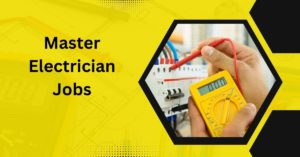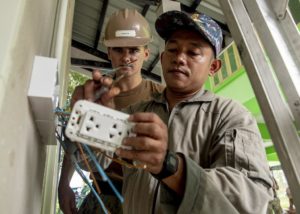Are you considering a career in the electrical field but not quite ready to jump in as a licensed electrician? Electrician helper jobs can be the perfect stepping stone to get your foot in the door. Whether you’re seeking hands-on experience, a stable income, or just want to see if this career is for you, working as an electrician helper can be a fantastic opportunity.
In this guide, we’ll discuss everything you need to know about electrician helper jobs, from what the role involves to how to get started. Let’s shed some light on how you can embark on this promising career path!

What is an Electrician Helper?
Table of Contents
An electrician helper is someone who works under the guidance of a certified electrician to assist with installations, repairs, and maintenance of electrical systems. Unlike licensed electricians, helpers are not required to have a license to start, making this role accessible for individuals with little or no prior experience.
Electrician helper jobs are ideal for those who enjoy working with their hands and are curious about how things work. These jobs are a great opportunity to learn the ins and outs of the electrical trade, gain valuable on-the-job training, and prepare for a future as a licensed electrician.
Why Choose Electrician Helper Jobs?
There are plenty of reasons why electrician helper jobs might be a great fit for you:
- Hands-On Learning Experience: As an electrician helper, you’ll learn directly from experienced professionals. You’ll be able to see how the work is done, ask questions, and receive on-the-spot training.
- Pathway to Certification: This role can provide you with the foundational knowledge and skills needed to eventually pursue your own electrician license.
- Job Stability: With the increasing demand for skilled tradespeople, electrician helper jobs offer a good level of job security. People will always need skilled workers to handle electrical issues, whether for residential or commercial needs.
- Career Growth Opportunities: Starting as an electrician helper gives you a great understanding of the trade. You can progress to become a journeyman electrician, and with experience, even move into more specialized or supervisory roles.
What Does an Electrician Helper Do?

The tasks of an electrician helper can vary depending on the specific project or job site. Here are some of the most common responsibilities:
- Assisting electricians in installing and maintaining electrical systems
- Carrying tools, materials, and supplies
- Cutting, bending, and mounting conduit
- Pulling wiring through electrical conduits
- Testing electrical systems and equipment under the supervision of an electrician
- Maintaining work areas and ensuring they are clean and safe
Skills Needed for Electrician Helper Jobs
While you don’t need formal qualifications, certain skills can help you succeed in this role:
- Basic Math Skills: Simple arithmetic is used frequently for measuring and calculating.
- Physical Fitness: The job often involves manual labor, including lifting and moving heavy materials.
- Team Player Attitude: You’ll be working under electricians and sometimes with other helpers, so being able to work well in a team is essential.
- Willingness to Learn: One of the biggest assets you can have is a genuine desire to learn and grow.
How to Get an Electrician Helper Job
If you’re ready to kick off your journey as an electrician helper, here are a few steps to help you get started:
1. High School Diploma or Equivalent
While you don’t necessarily need formal education, having a high school diploma or equivalent can help you stand out. Classes like math, physics, and shop can be particularly useful.
2. Get the Right Training
Although it’s not required, completing a pre-apprenticeship training program can give you a head start. Many community colleges and trade schools offer programs that provide foundational electrical training.
3. Look for Opportunities
Reach out to local electricians or electrical companies that may be hiring helpers. You can also check job boards, trade organizations, or even local unions for available positions.
4. Build Your Skills
Once hired, focus on learning as much as possible. Treat every task, no matter how small, as an opportunity to build your skills and expand your knowledge.
Pros and Cons of Electrician Helper Jobs
Like any job, electrician helper jobs come with their own set of pros and cons:
Pros:
- No Licensing Requirements: Unlike other electrical roles, you don’t need a license to get started.
- On-the-Job Learning: You’ll get paid while learning new skills that will be useful for your future career.
- Path to Higher Wages: As you gain experience, your earning potential increases significantly.
Cons:
- Physically Demanding: The work can be physically tough, involving lifting, bending, and working in awkward positions.
- Exposure to Risks: Working with electricity carries risks, but proper safety training can minimize these.
Common Questions About Electrician Helper Jobs
1. How much do electrician helpers make?
The pay for electrician helpers can vary based on location, experience, and employer. On average, you can expect to earn between $15-$20 per hour. As you gain more experience, your pay will likely increase.
2. Do I need a license to be an electrician helper?
No, a license is not required to become an electrician helper. However, if you decide to pursue a career as a journeyman electrician, you will need to be licensed.
3. Is it easy to get a job as an electrician helper?
Yes, since many electricians need extra hands, getting a job as an electrician helper is often easier compared to more specialized electrical roles. Networking and showing a willingness to work hard will greatly help.
Career Growth: Moving Beyond Electrician Helper Jobs
Many people start as electrician helpers and work their way up. The experience you gain in this position can prepare you for becoming a licensed electrician. With time, you may even specialize in specific types of electrical work, such as commercial, industrial, or residential.
Further down the line, opportunities to become a foreman or electrical contractor also open up. Electrician helper jobs are often the beginning of long and fulfilling careers in the trades.
Frequently Asked Questions About Electrician Helper Jobs
What are the educational requirements for an electrician helper?
Most electrician helper jobs require a high school diploma or equivalent. You don’t need formal college education, but technical courses can be helpful.
How can I advance my career after working as an electrician helper?
After gaining experience, you can apply for an apprenticeship to become a journeyman electrician. From there, you can specialize further or move into supervisory roles.
Is an electrician helper job right for me?
If you enjoy hands-on work, problem-solving, and don’t mind a physically demanding job, electrician helper jobs can be a great fit. They provide excellent on-the-job training and pave the way for future career opportunities.
Final Thoughts: Take Charge of Your Future
Electrician helper jobs are a fantastic entry point into the electrical trade. They provide the opportunity to earn while you learn, gain valuable skills, and work alongside experienced professionals. If you’re eager to start a rewarding career in the trades, this might just be the bright start you’re looking for!
Remember, every electrician once started where you are now—and they worked their way up through experience, dedication, and a willingness to learn. So, if you’re ready to get started, electrician helper jobs could be your first step to a brighter future.



